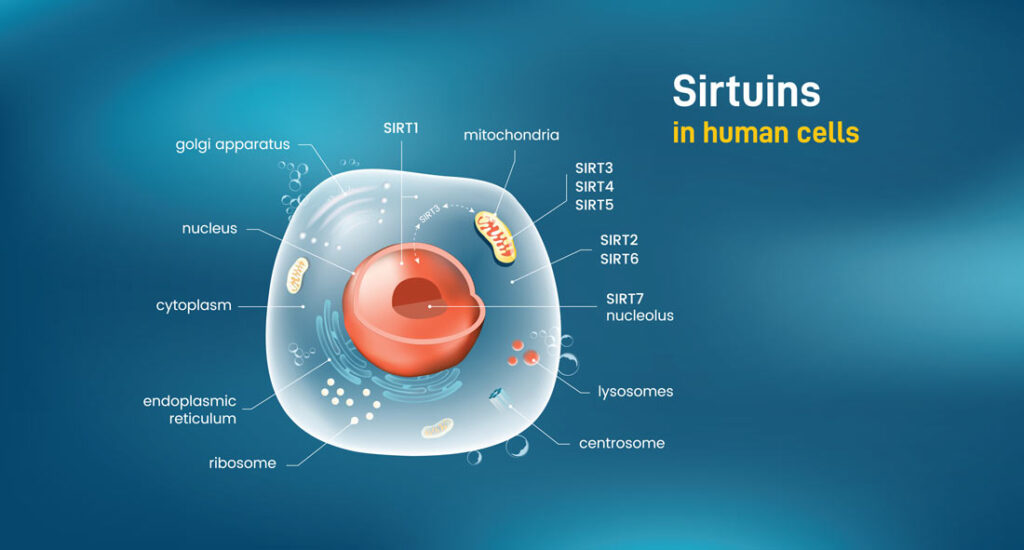You can’t research the most effective way to raise NAD levels — we believe it’s via NMN, by the way — without running into some mention of sirtuins, which are the proteins that regulate cellular health. But how exactly do they do that? What’s all this talk of activating sirtuins, and how does one even manage that? What’s the relationship between sirtuins and NAD, and where does NMN fit into the equation? Good question, and good news—if you’ve been wondering about sirtuins and NAD and how exactly they influence longevity, we have you covered.
Understanding sirtuins: their role and importance
Sirtuins are a family of protein enzymes that have been colorfully described as “cellular watchmen” and “stress sensors” and “longevity proteins,” and they’re all fitting titles. In mammals, there are seven sirtuins (SIRT1 all the way up to SIRT7), all of which play a role in cellular health regulation, especially under stress conditions (like rampaging free radicals or nutrient deprivation). In fact, it is the job of the sirtuins to regulate homeostasis, or balance, in our cells, which means they’re responsible for dealing with things like aging, inflammation, detoxification, stress resistance, metabolism, circadian rhythms, and something called mitochondrial biogenesis. In the process, sirtuins also control other genes, and they respond to all kinds of environmental factors. It’s all very complex, but for our purposes, the big takeaway is that sirtuins are directly involved with longevity, and thus terribly important, because they support cellular repair and help manage inflammation.
NAD and its crucial connection with sirtuins
Here’s the thing—sirtuins can only do their job properly when NAD is in the picture. They’re what’s known as NAD-dependent enzymes. NAD, or nicotinamide adenine dinucleotide, is the molecule that regulates cellular metabolism. It’s also the stuff that essentially “turns on” sirtuin activity. When NAD levels are high, sirtuin level is likewise booming. Here’s the problem: As we age, our NAD production slows down. Less NAD in the body is associated with a subsequent decline in our health and vitality, along with all kinds of age-related diseases—think heart disease and metabolic disorders, not to mention aging itself.
The NAD decline has another effect, and you may have already made the logical leap. Guess what happens to NAD-dependent enzymes when NAD production slows? Yep, they slow down too—and that’s exactly what happens with sirtuins. Among other drawbacks, that means a cascading effect on mitochondrial gene expression. Dysfunction in the mitochondria is considered a hallmark of aging. See what’s happening here?

Benefits of sirtuin-activating supplements
If a decline in sirtuin function negatively affects controls on aging and longevity, it makes sense that activating sirtuins might be a good idea. And there are indeed a handful of things that seem to positively affect these enzymes, from supplements to lifestyle factors:
- Resveratrol.This plant compound is perhaps the most researched of the sirtuin boosters. It’s a polyphenol, which means it occurs naturally in plants and can be found in nuts and grapes. Notably, resveratrol will survive the wine-making process, so it’s also found in red wine. It stimulates a sirtuin known as SIRT-1, which creates an antioxidant effect, improving insulin resistance and supporting NAD production, as well as the body’s muscular and nervous systems.
- Ergothioneine.Abundantly found in mushrooms, ergothioneine, or ergo, is known as the “longevity vitamin,” thanks to its dual ability to reduce oxidative stress and serve as a therapeutic agent. That makes it unique among antioxidants. Ergo’s protective effects are associated with SIRT1 and SIRT6 activity.
- Pterostilbene. This polyphenol, found in blueberries, is very similar to resveratrol, minus a small structural difference, and shares some of the same effects on SIRT-1.
- NMN. NMN is used to boost NAD in the body — the more NAD, the greater the sirtuin activity. This approach has the benefit of convenience because NMN can effectively be taken in supplement form. Two Wonderfeel Youngr™ NMN capsules deliver 900 mg of NMN, 100 mg of resveratrol, 80 mg of hydroxytyrosol, 4 mg ergothioneine, and 20 mcg of vitamin D3, a dose based on available research to ensure you get all the benefits of NAD—and that includes active little sirtuins
- Curcumin. A flavonoid found in turmeric, curcumin helps boost more than half of the sirtuins found in mammals.
- Exercise. We know that regular exercise improves health across multiple parameters, and that includes sirtuin levels. A meta-analysis from 2023 found that the act of physical exercise, including both aerobic and resistance activity, increases SIRT1 levels. Plus, the longer and more intense the exercise, the greater the sirtuin boost.
- Calorie restriction and intermittent fasting. Restricting calories is largely considered one of the best ways to extend life and healthspan, simply because it delays the onset of all kinds of age-related diseases by boosting the production of sirtuins. Intermittent fasting has the same effect.
The interplay between NAD, sirtuins and longevity
Longevity scientists will tell you that the relationship between NAD and sirtuins is key to understanding healthy aging on a cellular level. As NAD begins its inevitable decline, sirtuin activity is likewise diminished. That negatively affects cellular maintenance and repair, which is directly related to aging and all of the age-related diseases that go along with it.
The good news is that replenishing NAD levels, which can be done with a precursor like Wonderfeel Youngr™, is an easy way to jumpstart sirtuin activity and support longevity. In fact, our formula includes a trio of antioxidants, including resveratrol and ergo, that work to increase NAD, shield against oxidative stress, and activate sirtuins. But what really sets it apart from other NAD supplements on the market is that it actively safeguards against NAD consumers in the body, like the enzyme known as CD38. In that regard, Youngr™ doesn’t just boost NAD—it simultaneously slows down NAD depletion for greater efficacy. It’s not just about elevating NAD. It’s about maintaining those elevated levels to ensure that sirtuins can function as they’re meant to.
The Sirtuin/NAD takeaway
Research into sirtuins is still relatively new, but we’re sure of a few things. First, sirtuins have a very complex, very important role in cellular health and are absolutely involved with longevity and healthspan. Second, sirtuins need NAD to function properly — these compounds are intimately connected on multiple levels, and all of the enzymatic activities the sirtuins so busily undertake specifically require NAD. And third, sirtuins respond to environmental factors, which is one reason things like a healthy diet with specific nutrients and regular exercise contribute to a longer, healthier life. Round that out with NMN, and you’ll keep those sirtuins pretty happy!













